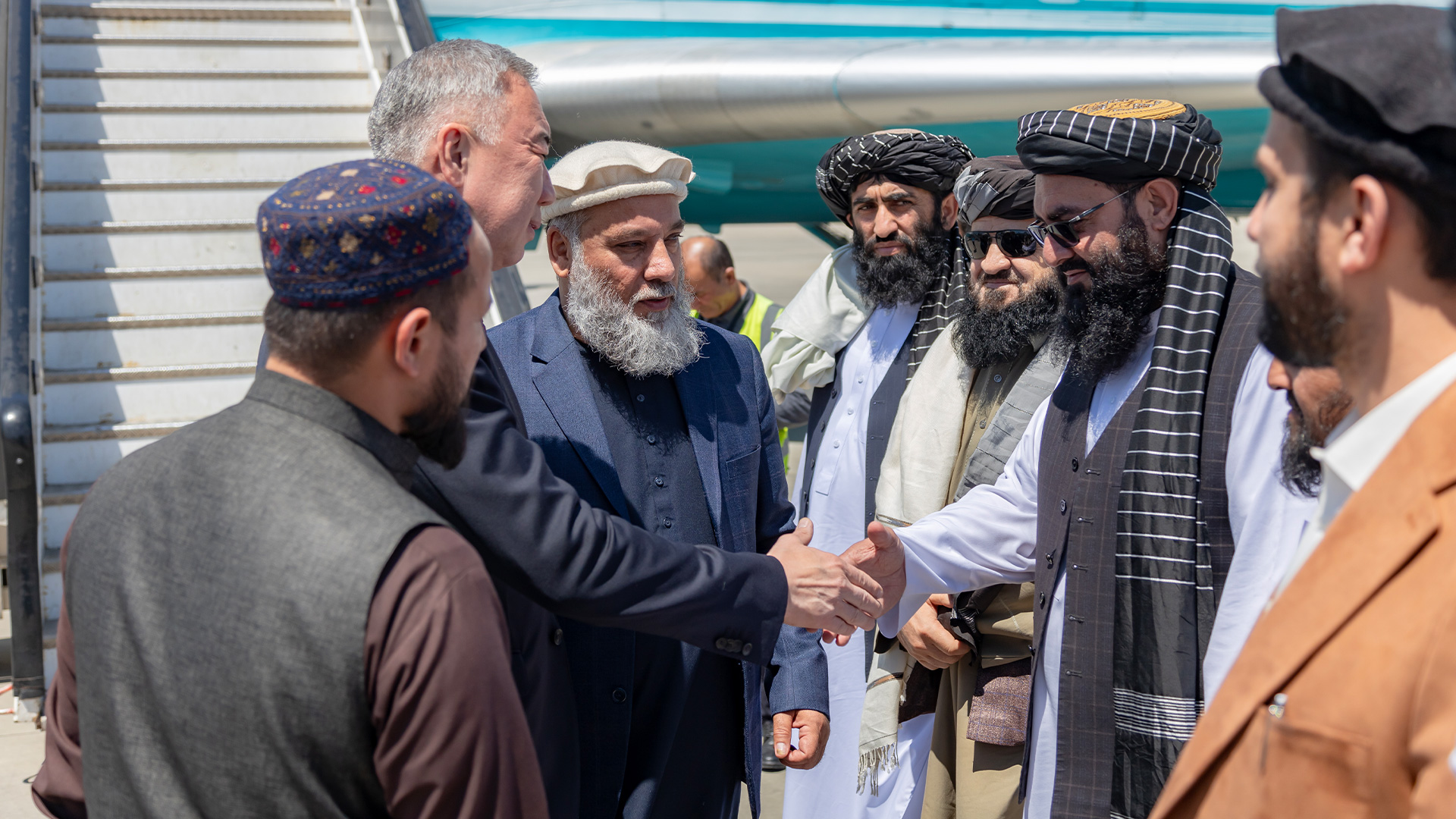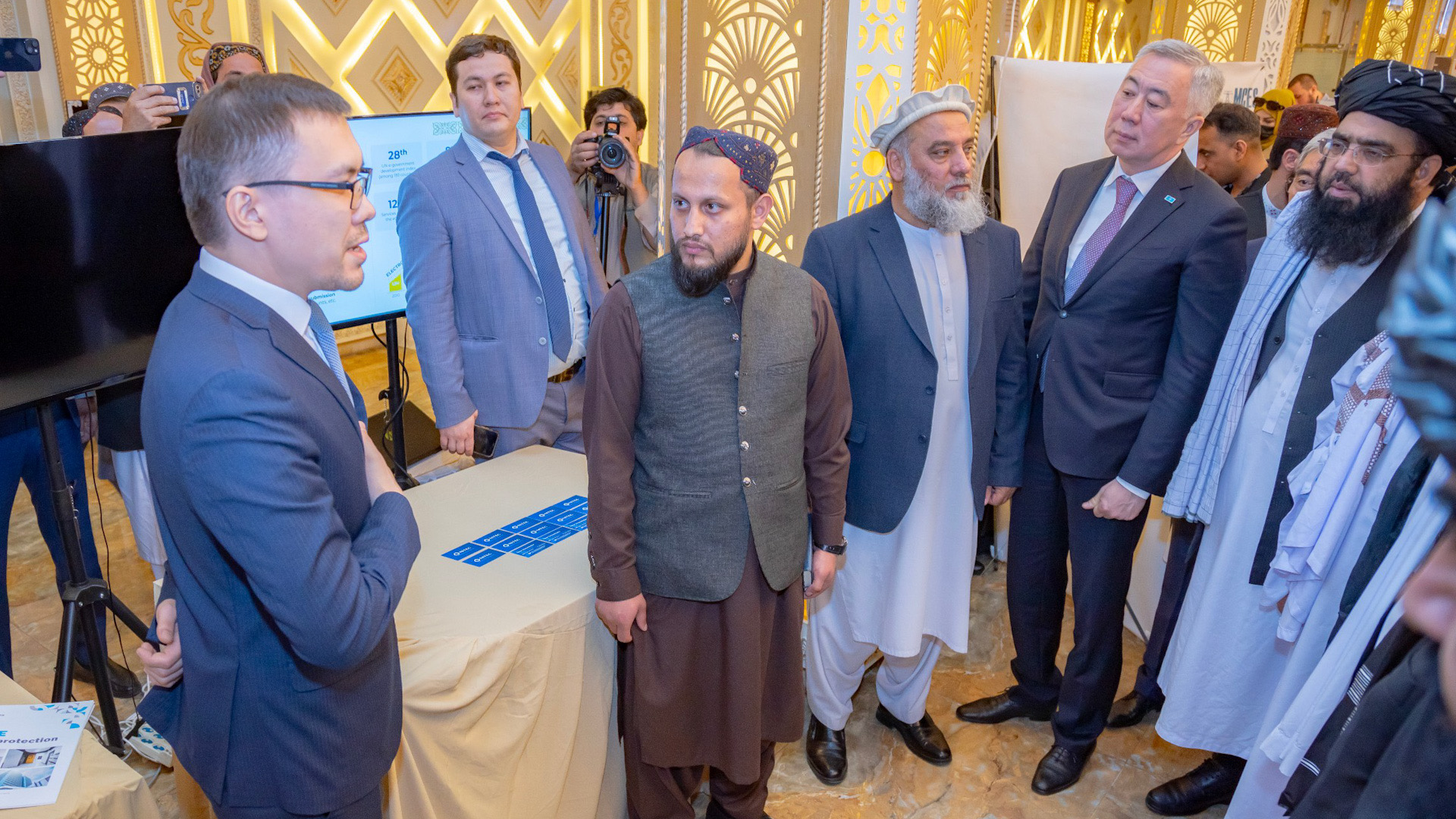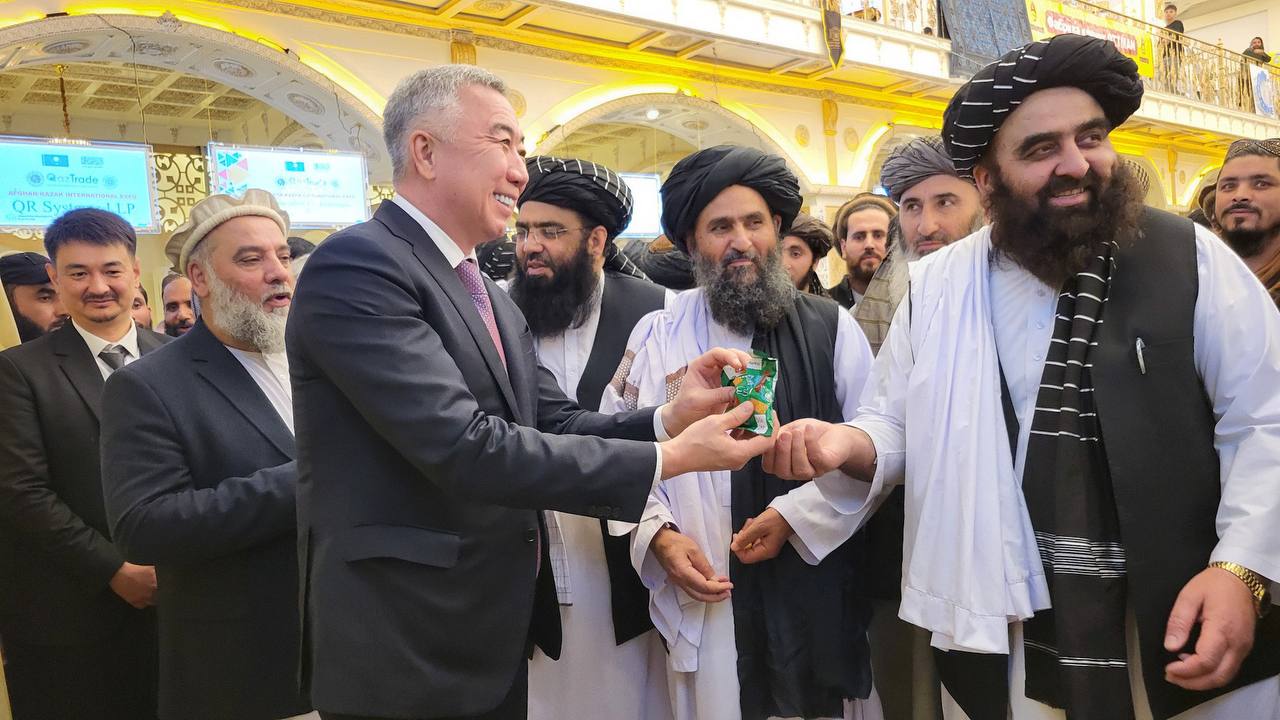ASTANA – A top-level Kazakh delegation, led by Deputy Prime Minister Serik Zhumangarin, visited Kabul last week to forge closer trade ties with Afghanistan. Kairat Torebayev, Kazakhstan’s Vice Minister for Trade and Integration, who was part of the delegation, disclosed the details of the trip and shared assessments of the prospects for relations between Kazakhstan and Afghanistan in an exclusive interview with The Astana Times.

The Kazakh delegation arrives in Kabul. Photo credit: primeminister.kz
First of all, could you tell us about the prospects for trade and economic cooperation with Afghanistan?
Kazakhstan ranks among the top ten major trading partners of Afghanistan internationally as well as in Central Asia. Afghanistan traditionally imports grain and flour, while Kazakhstan imports carbonated drinks, grapes, and dried fruits.
During a recent visit, Kazakhstan proposed diversifying cooperation with Afghanistan in the chemical industry, miningand metallurgical complex through the implementation of joint projects in geological exploration, mining and processing of solid minerals in Afghanistan, as well as in the field of IT technology. We are ready to provide technological solutions to expand and deepen trade and economic cooperation between our countries.

A representative from the National Information Technologies shows Kazakhstan’s digital solutions to the Afghan delegation. Photo credit: primeminister.kz
We are also interested in supplying Kazakh-made cars and subsequently localizing dealership centers for their service in Afghanistan.
Kazakhstan is ready to continue cooperation along the traditional lines of supplying food products and has offered to use the capacities of the Beineu terminal in the Mangistau Region, which has direct access to the Kazakh-Turkmen border.
The terminal has all the necessary production infrastructure. It can function as a land transshipment terminal or storage facility for further transportation of products for export. The terminal’s capacities allow shipping up to 100,000 tons of grain per month, 12,000 tons of flour, and up to 3,000 tons of compound feed.
What are some of the outcomes in trade and economic cooperation that have been achieved over the past two years?
Over the past two years, we have established close contacts and a stable dialogue with representatives of Afghanistan – including entrepreneurs and the business community. We held the first joint business forums in Astana and Kabul.
It is very important for Kazakhstan to build long-term and reliable relationships with our partners. And we have observed how Afghanistan is managing some of the complex economic and political issues during this period.
What were the outcomes of the recent business forum in Kabul?
Thirty-five Kazakh companies presented their products and services at the Kazakhstan-Afghanistan business forum and thematic exhibition in Kabul. It is the first time such a large number of business people participated in a joint event.

Zhumangarin offers a Kazakh-made product to an Afghan official. Photo credit: primeminister.kz
To establish new areas of cooperation, the delegation included representatives from Qarmet [Kazakhstan’s steel and mining company], Doscar Group [an official dealership of automobile brands like Kia and Chevrolet], Kentau Transformer Plant [Kazakhstan’s leading producer of transformer equipment based in the Turkistan Region], Kaspy Group of companies [which specializes in manufacturing metal structures and agricultural machinery], as well as manufacturers of laboratory tests, medicines, vegetable oils, confectionery products and textiles.
At the business forum, agreements worth more than $12 million were reached for the supply of sunflower oil, cereal products, and flour. Additionally, the Trading House of Kazakhstan officially started operating in the city of Herat in Afghanistan, which will further enhance the active Kazakh-Afghan trade and economic relations.
In what ways can Kazakhstan benefit from the development of ties with Afghanistan?
Afghanistan has access to the nearby large markets of Pakistan, India, and the Middle East, which are of great interest to Kazakhstan. Moreover, with a market of almost 40 million people, Afghanistan itself offers a significant opportunity for Kazakhstan to supply quality products and services.
Additionally, Afghanistan’s territory has huge potential for mineral extraction. The country has rich reserves of oil, natural gas, coal, iron, non-ferrous metals, and rare earth metals.
Possessing significant reserves of oil, gas, and solid minerals, Kazakhstan has formed a professional pool of oilfield service and mining companies over the years that can compete with foreign suppliers in construction and installation works, well workovers, expertise, laboratory research, design, engineering, and drilling.
Over the past five years, private investments in solid minerals exploration in Kazakhstan have increased 2.5 times – from 33.9 billion tenge ($76.6 million) in 2018 to 82 billion tenge ($185.4 million) in 2023.
During a meeting with Afghanistan’s acting Minister of Mines and Petroleum, Shahabuddin Dilawar, we discussed cooperation prospects in geological exploration and mineral extraction. We agreed to establish a technical committee of specialists from the two countries to identify joint projects and their implementation.
Are there any agreements with Afghanistan beyond trade, investment, and humanitarian aid?
During the visit of the Kazakh delegation, a meeting took place between Kazakh Deputy Prime Minister Serik Zhumangarin and Afghanistan’s acting Deputy Prime Minister for Political Affairs Abdul Kabir. The Kazakh side stated that it will continue to provide humanitarian assistance to Afghanistan as long as it is needed. Additionally, we are increasing the quota for Afghan students from 30 to 60 to enable them to study at Kazakhstan’s universities.
This summer, we are also ready to host 30 Afghan children for a 10-day vacation in children’s camps in our country. All these efforts will help strengthen relations between our countries and ensure they are long-term.
Abdul Kabir expressed gratitude for Kazakhstan’s attention and assistance in stabilizing the situation in Afghanistan, which has been experiencing significant political, economic, and humanitarian crises for several decades. Specifically, he thanked Kazakhstan for regularly providing humanitarian aid, which has helped improve the conditions of vulnerable populations, particularly women, and children.
He also expressed gratitude for measures to exchange trade and business delegations, including organizing exhibitions of products from both countries. He emphasized that the main priorities of the Afghan current authorities are maintaining internal security and improving the socio-economic situation. He also stressed that Afghanistan does not want to be a threat to the region and intends to improve relations with neighbors through the progressive development of trade and economic relations.
Furthermore, he also noted that improving the Afghan economy contributes to stabilizing the internal political situation in Afghanistan, resolving complex humanitarian issues, as well as reducing risks and threats of radicalism and terrorism. He mentioned that Afghan authorities are paying significant attention to fighting the Islamic State Khorasan terrorist group.
What obstacles might arise in the development of economic cooperation between the two countries, and how can they be overcome?
Political instability, security issues, and administrative barriers could pose challenges. These, however, can be mitigated through diplomatic efforts, improving infrastructure, and developing international cooperation.
That is why we are grateful to the interim Afghan government for its newly stated commitments to ensuring security in the country, which will have a positive impact on the situation in the region.
How can Kazakhstan help develop transit routes through Afghanistan, and how can both countries benefit from it?
Expanding regional transportation opportunities was one of the key goals of the Kazakh delegation’s recent visit to Afghanistan. During their meeting, Serik Zhumangarin and Afghanistan’s acting Deputy Prime Minister for Economic Affairs Abdul Ghani Baradar expressed mutual interest in developing cooperation on transport integration projects in Central and South Asia.
Kazakhstan can help develop transit routes through Afghanistan by providing investments, expert support, and logistical links. This will benefit both countries and promote the integration of regional economies. One of the priority projects for Kazakhstan is the construction of the Trans-Afghan railways: Termez-Mazar-i-Sharif-Kabul-Peshawar and Herat-Kandahar-Spin Boldak.
The project will reduce the delivery time of goods between the countries of the region by almost 10 times, as well as the cost of cargo transportation. Kazakhstan is ready to participate in the construction of the Trans-Afghan railway by supplying Kazakh-produced materials for the upper structure of the railroad, sleepers and fasteners.
Additionally, following a trilateral meeting in Kabul between Kazakhstan, Turkmenistan, and Afghanistan, the sides agreed to create favorable and competitive tariff conditions, which will facilitate the accelerated passage of container trains from China through Kazakhstan and Turkmenistan to Afghanistan and further to Pakistan, India, and the Middle Eastern countries.
According to preliminary estimates, the delivery time of goods via the accelerated route from Xian/Urumqi in China to Afghanistan’s Turgundi and Andkhoy will be reduced to 10-12 days.
Using the new transit route will allow Afghanistan to ensure uninterrupted delivery of Chinese goods to the west of the country and significantly reduce the cost of delivering goods compared to other modes of transportation.
Afghan businesses are offered an opportunity to utilize the Kazakh terminal in the dry port of Xian to consolidate the most in-demand goods into container trains and directly deliver consumer goods, such as solar batteries, diesel generators, cell phones, office equipment, among others.

